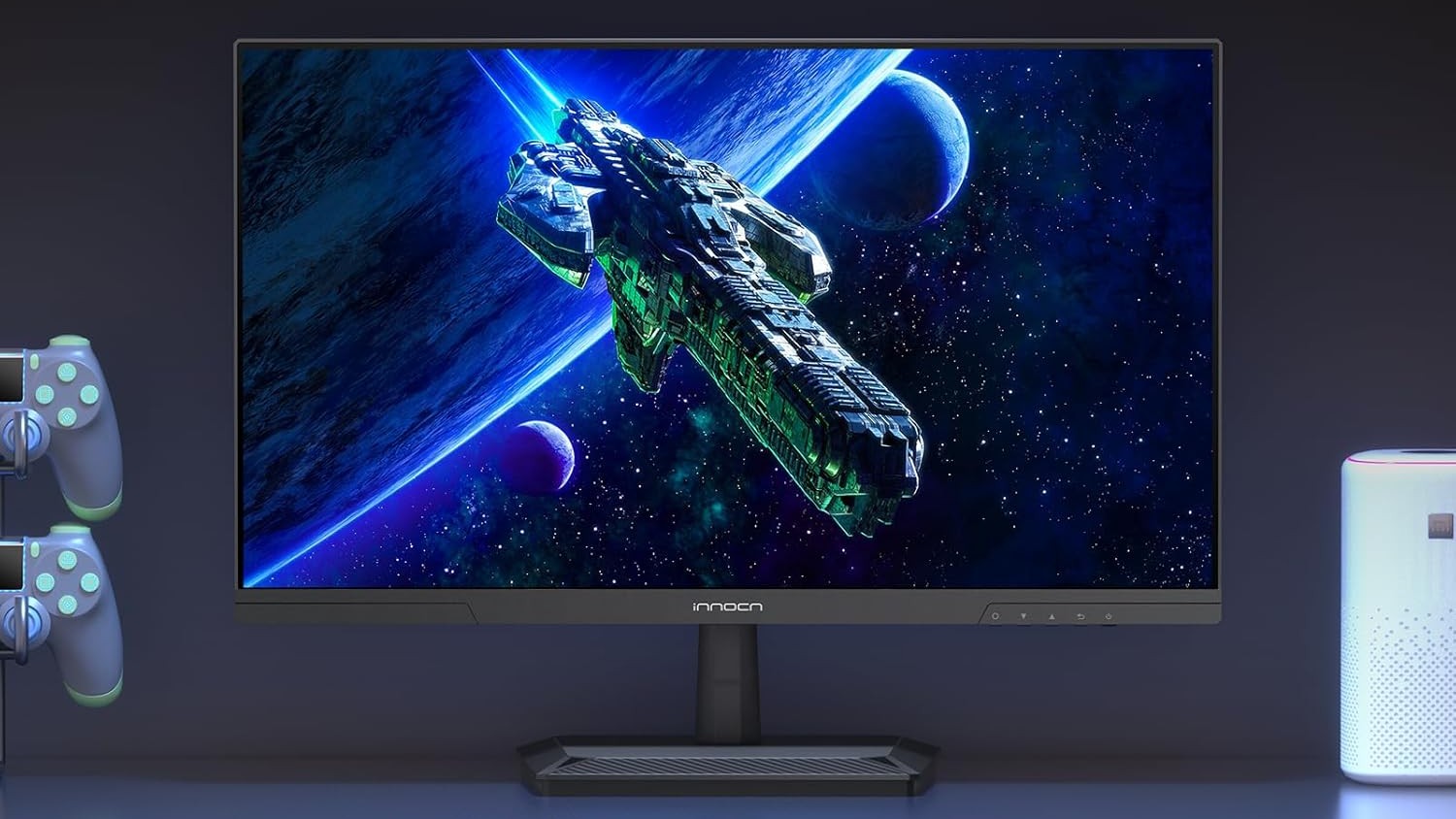Best NAS for home 2025
The best NAS for your household.
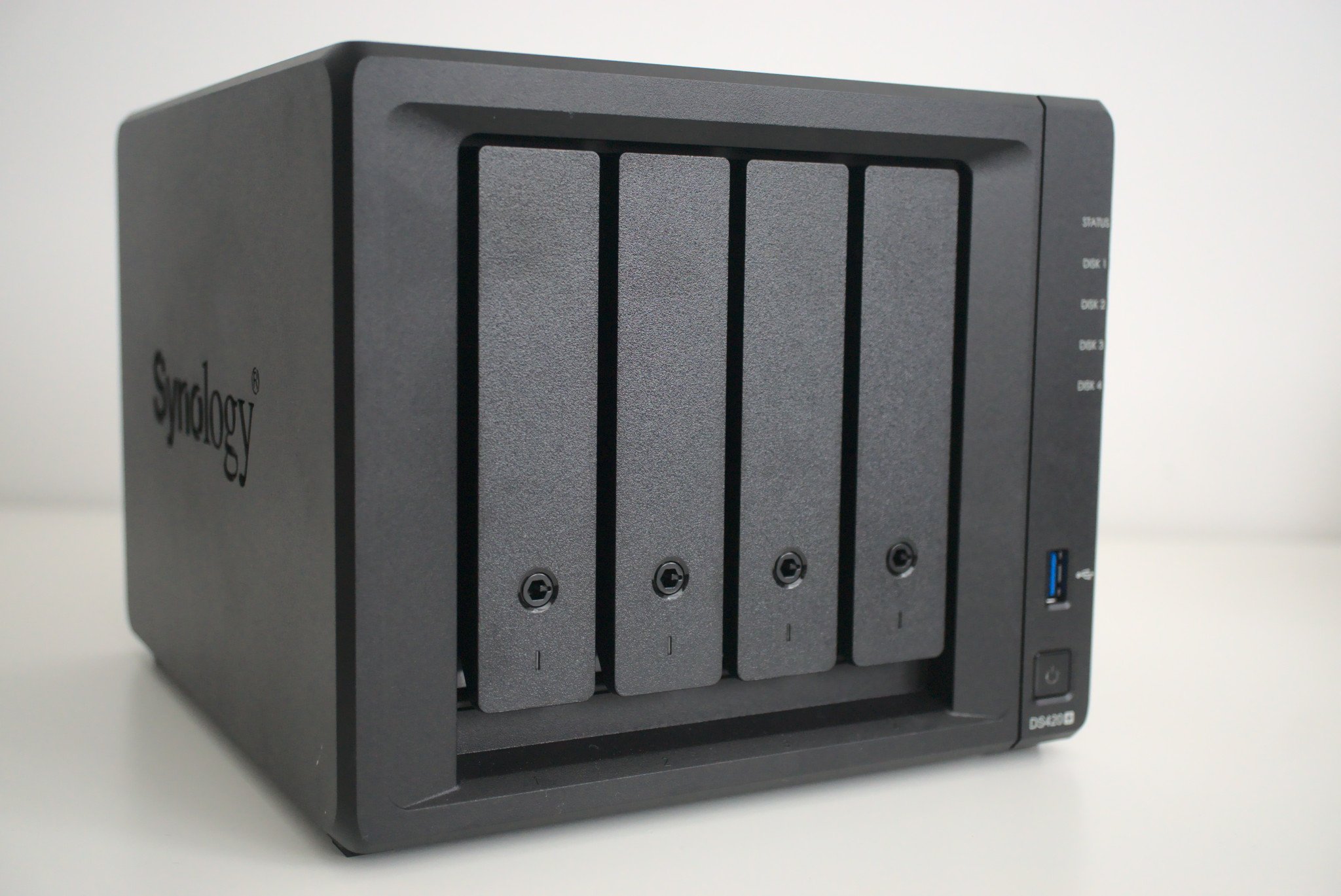
Network-attached storage (NAS for short) is a small server that can be connected to your home network to create your very own media center, cloud file storage, or even a surveillance platform. You can spend very little on a simple enclosure that'll handle file storage or thousands on range-leading servers with impressive performance. We've rounded up the best NAS from Synology, ASUSTOR, QNAP, and other brands to help you choose the right one for your home.
What is the best NAS for your home?
Why you can trust Windows Central
Choosing the best NAS for your home is primarily driven by the price of enclosures. These little server units can start at affordable prices, but when you factor in uprated internals, features like M.2 slots, and upgradeable RAM, you can quickly see the price spiral out of control. The second most important factor in the decision-making for a NAS enclosure is the number of drive bays.
The higher the number of bays, the more drives you can install, and the more capacity you can have for storing all your stuff. Generally, you'll want to steer clear on single-bay NAS enclosures because we always recommend at least two drives to be installed for a RAID configuration to better safeguard against data loss — RAID is a redundancy measure that makes sure if one drive fails, you'll not lose any data.
Numerous vendors make NAS enclosures with some of the best models coming from Synology, QNAP, TerraMaster, and ASUSTOR. For most people, however, the Synology DiskStation DS220+ is the best choice overall. If it's not quite what you're looking for, the ASUSTOR NIMBUSTOR 4 (AS5304T) is an excellent second choice. For those who want to set up a Plex Media Server (PMS), the QNAP TVS-672XT is what you'll need.
You don't have to spend much to get a good NAS either. The Synology DiskStation DS120j and TerraMaster F2-221 are fine examples of savings to be had without sacrificing too much on functionality, so long as you only plan on using these servers for file storage. An important fact to remember: Intel processors are generally more capable than ARM (basically non-Intel) CPUs.
When deciding on a NAS enclosure to purchase, you'll need to bear in mind a few factors. Do you intend to use the NAS for simply storing files? If so, what kind of files will you be storing? If you only plan on backing up several devices, you can get away with enclosures with but a few drive bays. If you want to replace your online cloud storage subscription service, you'll likely need four bays or more.
Price is essential with any purchase you make. No one wants to be spending more than they should on a product they may not get the most out of. We wouldn't want that either, which is why this collection of NAS exists to aid you in making the right decision. Whether or not you can upgrade the RAM inside a NAS, install an M.2 SSD to act as a cache and increase system performance, or hook up a 10Gb network line are all notable features.
The issue with going for a NAS enclosure that supports all the aforementioned options while coming with a powerful Intel CPU is the price. The cost of enclosures can get really high, really fast. Luckily, once you've purchased a NAS, the chances of you missing out on anything in the successor range is slim, which means you should be able to get anywhere up to a decade with a single enclosure. The price doesn't look too bad now, right?
A NAS can remain relevant, especially if it has faster LAN ports, M.2 slots, plenty of drive bays, and one of the best processors you can buy right now. Like choosing a GPU for your PC, it's essential to pick the best graphics cards you can afford to save upgrading sooner.
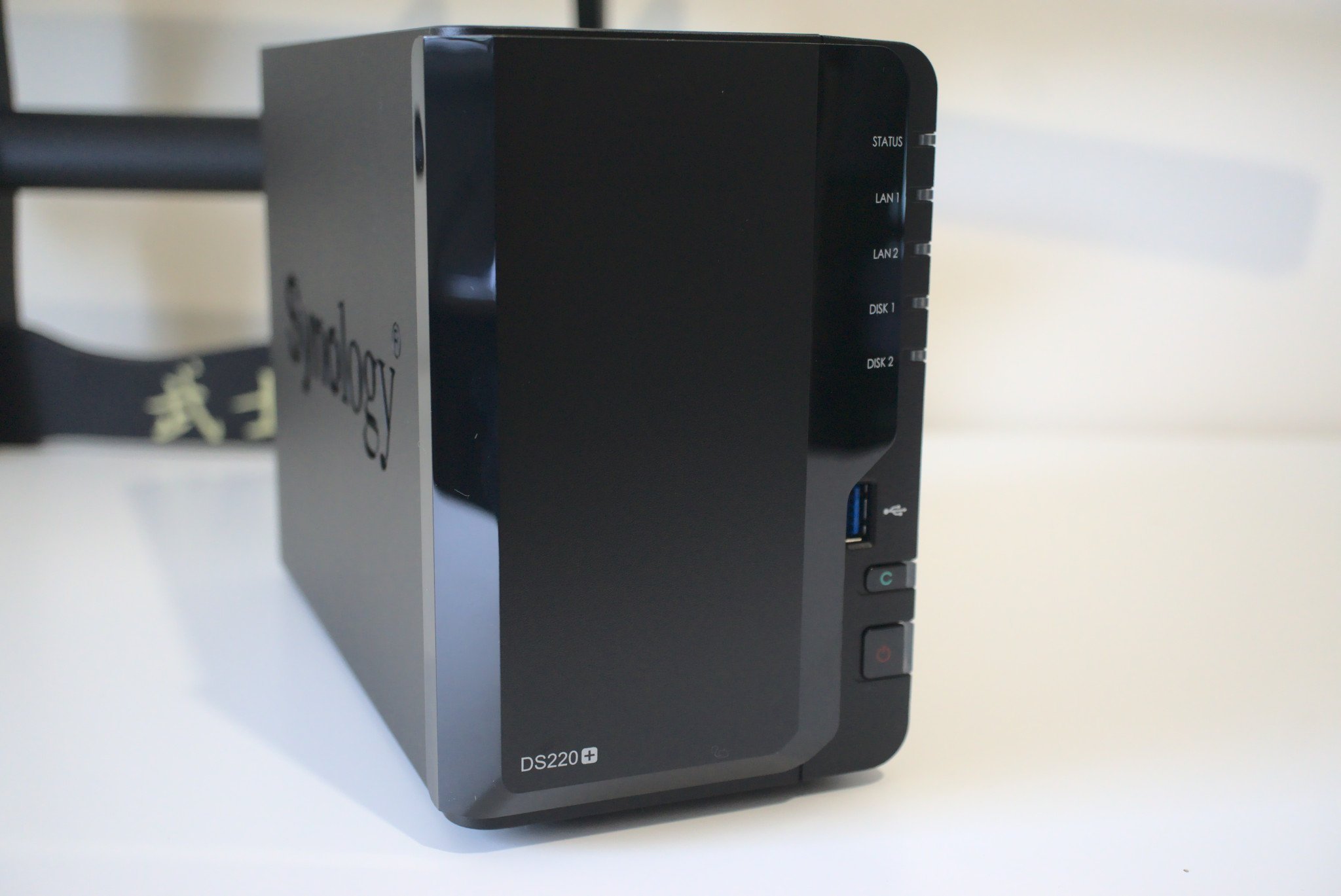
Synology DiskStation DS220+
Specifications
Reasons to buy
Reasons to avoid
Bottom line: The best overall NAS for the home has to get a lot right, and Synology already nailed this with the exceptionally positioned DiskStation DS218+. The company revamped this enclosure for 2020, and the result is the DS220+ with improved internals and a better CPU. It's a fantastic NAS enclosure for the price.
I may have come across a little too strongly with the "you could get the NAS purchase wrong" since any enclosure you pick up will be able to be configured as a home file storage hub. But picking one with the capabilities for Plex playback at 4K or can be kitted out with 10 hard drives for up to 160TB of capacity, that's when you need to pay attention to the specifications and marketing.
If we were to choose a NAS for the home that strikes a good balance between price and performance, it would be the Synology DiskStation DS220+. This powerful enclosure houses an Intel Celeron J4025 CPU with 2GB of DDR4 RAM, making it suitable for even the busiest homes with numerous simultaneous connections. Want to enjoy some movies through Plex? You could even do that here.
The two drive bays make it easy to throw a few drives into the enclosure and enjoy up to 32TB of storage capacity, though you'll more likely see 16TB with RAID enabled (and we recommend doing so for data redundancy). With two 1Gb LAN ports, you can connect both to your router or switch which will then allow the connection to be doubled up for enhanced bandwidth.
Its hot-swappable drive tray design allows for easy installation and maintenance, destroying the requirement for a screwdriver to remove or install a hard drive. Simply pull out, swap, re-insert, and you're good to go. There are a few USB 3.0 ports, and you can upgrade the RAM, making this a NAS you could even expand upon and use for more demanding tasks. The processor is capable, but it won't win any awards against more expensive enclosures.
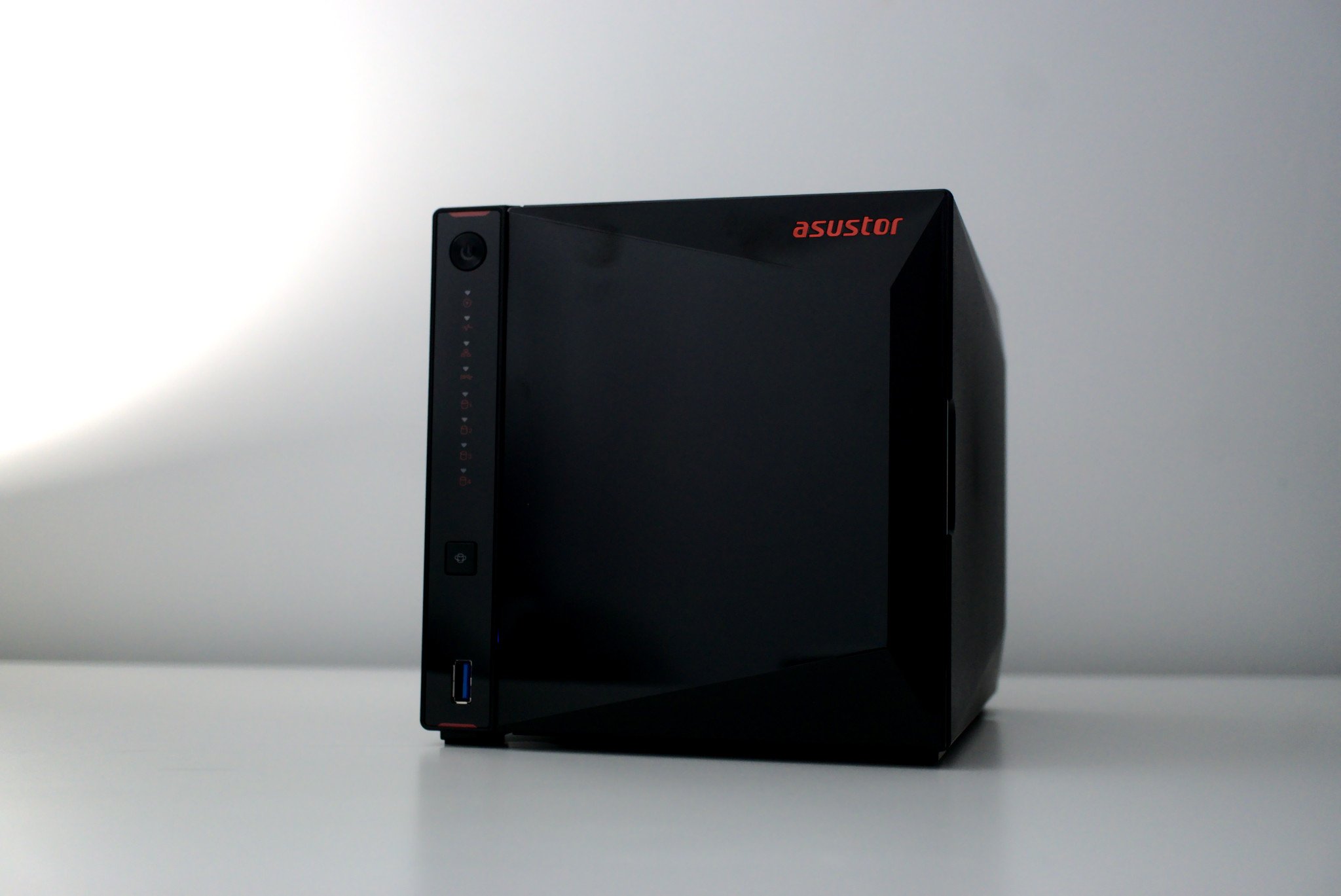
ASUSTOR NIMBUSTOR 4 (AS5304T)
Specifications
Reasons to buy
Reasons to avoid
Bottom line: Not only does the NIMBUSTOR 4 from ASUSTOR look better than the usual black slabs we're used to with NAS enclosures, but it's also got plenty of kit inside the chassis. I'm talking powerful Intel processors, all the drive bays you'll need for the home, more RAM than you require, and super-fast 2.5Gb LAN.
The ASUSTOR AS5304T is a very capable NAS. It's inspired by the latest trends in gaming design, rocks a beefy Intel Celeron J4105 CPU, and upgradeable 4GB of DDR4 RAM for optimal performance at this price point. This configuration even allows for some stable 4K movie transcoding. It's not all about looks.
There are loads of apps supported by ASUSTOR's user-friendly OS, and the dual-2.5Gb LAN setup lets you eliminate any network bottlenecks, so long as your LAN infrastructure can keep up. This is especially important if you're a streamer and are looking for something that can handle the bandwidth that comes with offloading recorded media.
The only drawback is the price, which puts it above other four-bay NAS models, but this has a few advantages, including the faster CPU and LAN ports. If your budget can stretch to cover the AS5304T, it'll perform admirably in your gaming, streaming, or home media server setup.
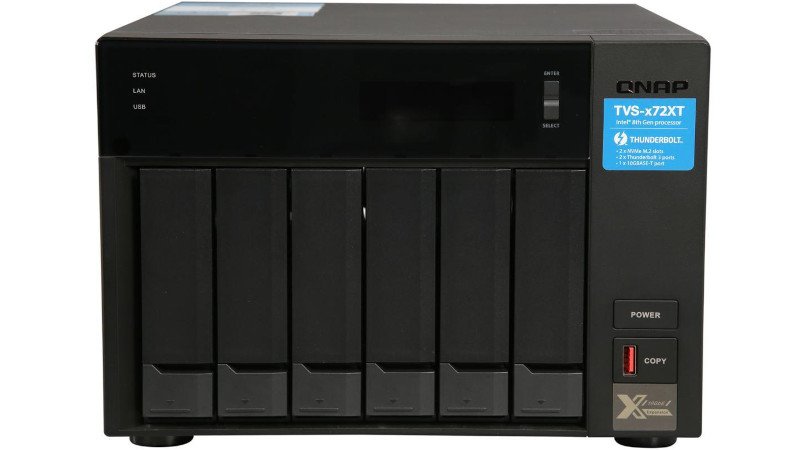
QNAP TVS-672XT
Specifications
Reasons to buy
Reasons to avoid
Bottom line: QNAP went all out with the QNAP TVS-672XT. It has a desktop-class Core i3-8100T that's more than capable of handling 4K movie transcoding. There are six drive bays for storing all your media, and four 5Gb LAN ports will ensure you have enough bandwidth to stream it all.
The QNAP TVS-672XT is one of the best NAS for Plex. To truly make the most out of the media server and platform, you need a capable server with a powerful processor. The Intel Core i3-8100T isn't the most powerful CPU around, but in the world of NAS, where we're used to Intel Celeron, Pentium, Atom, as well as some ARM CPUs, it's exceptionally good.
The integrated graphics and four physical cores are more than a match for 4K transcoding, which is required if you want to stream a 4K movie to a TV or other receiving device that doesn't support the file format. This processor is joined by 8GB of DDR4 RAM, which can be upgraded to 32GB, and six drive bays for storing all your media.
In case you thought you wouldn't be able to stream multiple movies at once, think again since this NAS has a rapid 10Gb LAN port as well as two additional 1Gb connections. Then you have two USB-A 3.1 Gen 2 ports and a further single USB-C 3.1 Gen 2 port. This NAS is well-equipped.
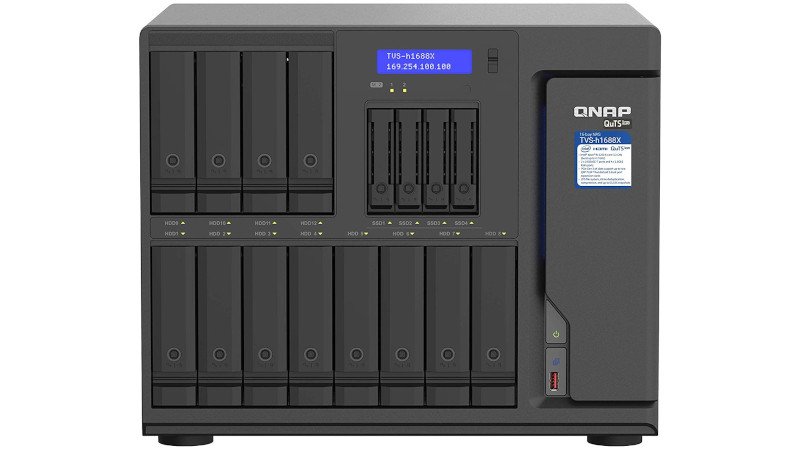
QNAP TVS-H1688X
Specifications
Reasons to buy
Reasons to avoid
Bottom line: Should you need to store plenty of data, you'll want something like the QNAP TVS-H1688X. It's huge, requires plenty of power while up and running, and has a capacity beyond 192TB when fully equipped with hard drives and SSDs. This NAS can even be upgraded with up to 128GB of DDR4 RAM.
QNAP has one goal in mind with the TVS-H1688X and that was to offer as much capacity as possible for NAS owners. This enclosure can hold 192TB of data in the 12 drive bays alone. You then have an additional four SSD bays and two M.2 slots. That's a lot of storage capacity, which is what this NAS is all about.
To handle all that data, QNAP opted for the Intel Xeon W-1250. This processor is a monster, much like other server-grade Xeon processors enthusiasts love to use. This thing is better than most Celeron and Pentium offerings found in NAS enclosures. It'll handle 4K movie transcoding and then some.
This NAS is best suited for file storage in a busy household or bustling office. The massive capacity is joined by four 2.5Gb LAN ports and two 10Gb LAN ports. For USB, QNAP has you covered with a total of two USB-C 3.2 Gen 2 ports and four USB-A 3.2 Gen 2 ports. The price is a little high for most NAS owners, and the power draw will make anyone looking to save on their energy bills look the other way.
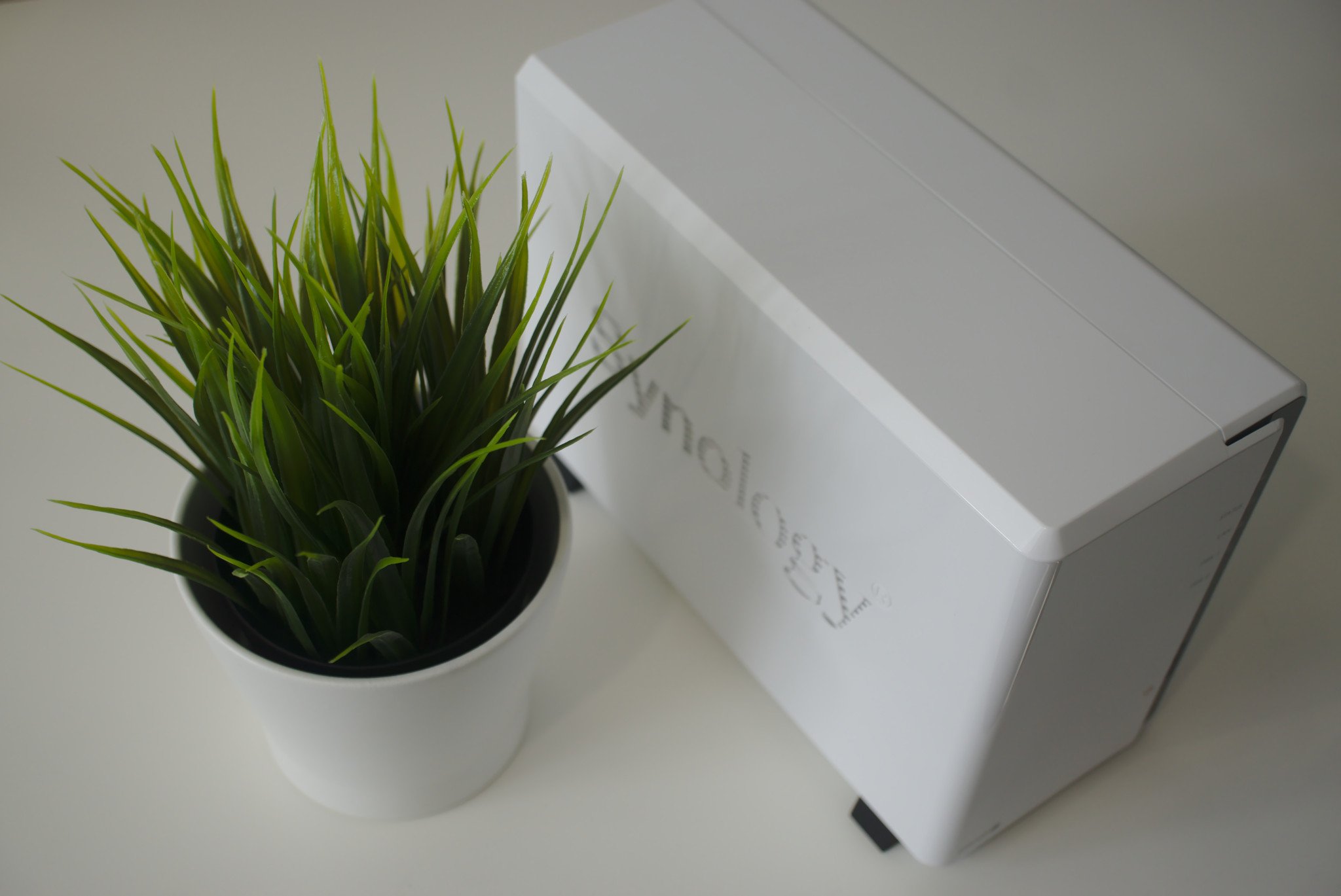
Synology DiskStation DS120j
Specifications
Reasons to buy
Reasons to avoid
Bottom line: Synology not only makes more expensive NAS enclosures but also creates options for those on tighter budgets and/or who don't require all the functionality offered in higher-end models. This is where the DiskStation DS120j comes into play with its single drive bay, 1Gb LAN port, and 512MB of RAM.
Instead of including a more expensive Intel processor, Synology opted for the Marvell Armada 3700 88F3720 CPU, which is perfectly fine for efficient NAS operation but may struggle when you want to do more demanding tasks. In fact, as of right now, Plex isn't supported, but what the DS120j does well is offering exceptional value.
So long as you don't need to do anything demanding with your NAS, the DiskStation DS120j will be more than happy to power through. It only has 512MB of DDR3L RAM and one drive bay, but you do get a server enclosure that can be connected online and provide a single location for file storage.
If you simply need to store a few files and don't need to do anything with your NAS, like run a media server, a surveillance system, or other demanding tasks, the DS120j will be enough. In essence, it's beneficial for those new to the world of NAS, and wanting an affordable device to test out.
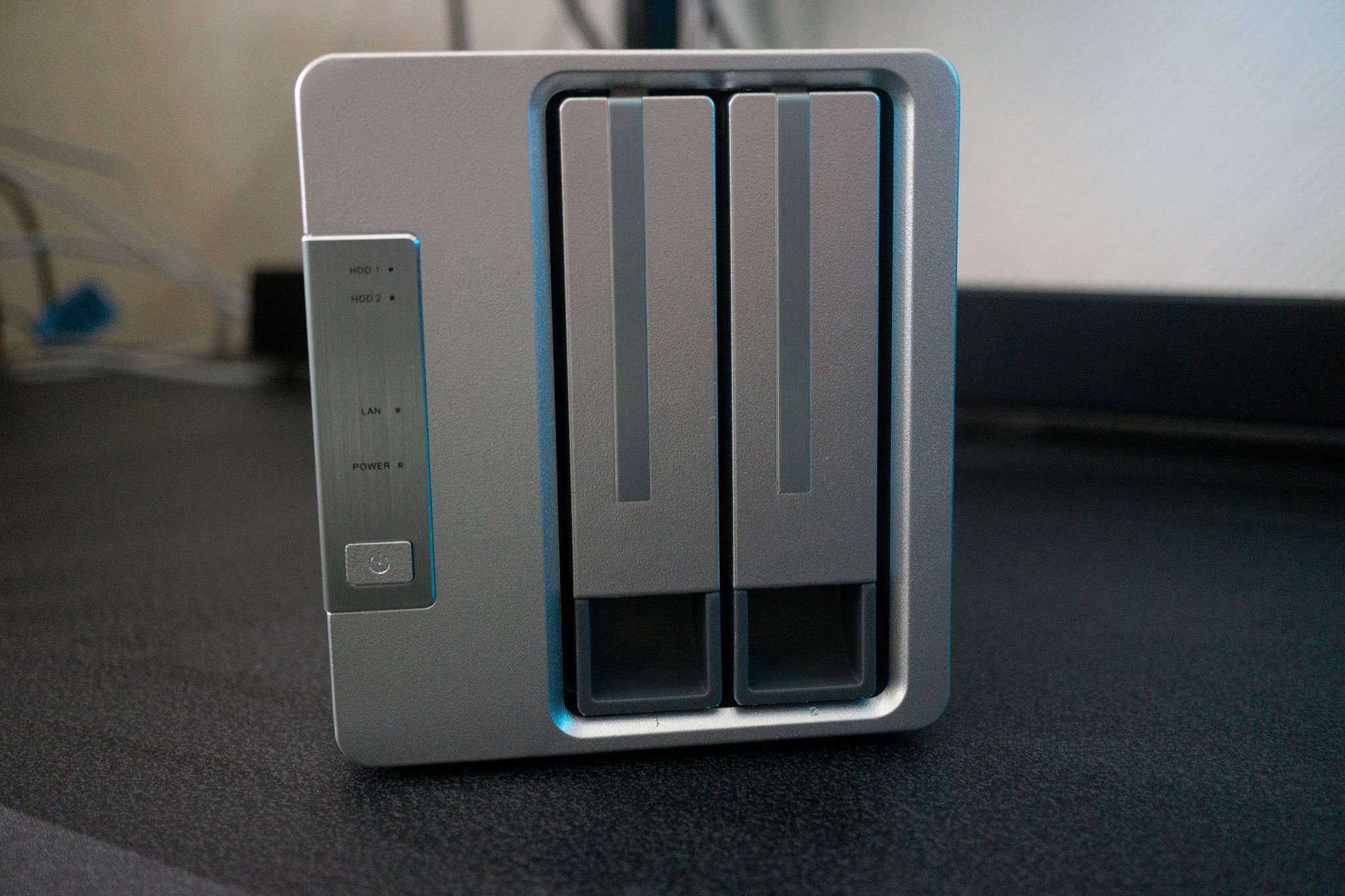
TerraMaster F2-221
Specifications
Reasons to buy
Reasons to avoid
Bottom line: Not everyone needs the most powerful NAS on the market, but the more affordable and weaker enclosures may not be enough. This is what makes the TerraMaster F2-221 an excellent choice, thanks to its Intel processor, upgradable RAM, and dual 1Gb LAN ports.
The TerraMaster F2-221 comes rocking excellent specifications for the price, comprised of an Intel Celeron J3355 dual-core CPU, which makes this a great enclosure if you want a budget-friendly model without an ARM processor.
Then you have two Gigabit LAN ports, 2GB DDR3 RAM (expandable up to 6GB), and two USB 3.0 ports. It's not the most potent NAS available, but at this price, you're getting a lot for your money. Unfortunately, this TerraMaster NAS is let down by the OS, which, while good, simply doesn't match QNAP or Synology.
It's not terrible, far from it, but you'll notice a difference in polish compared to other vendor OS solutions. Like other diskless NAS listed in this collection, you'll need to factor in the price of the hard drives you plan to install inside the two bays.
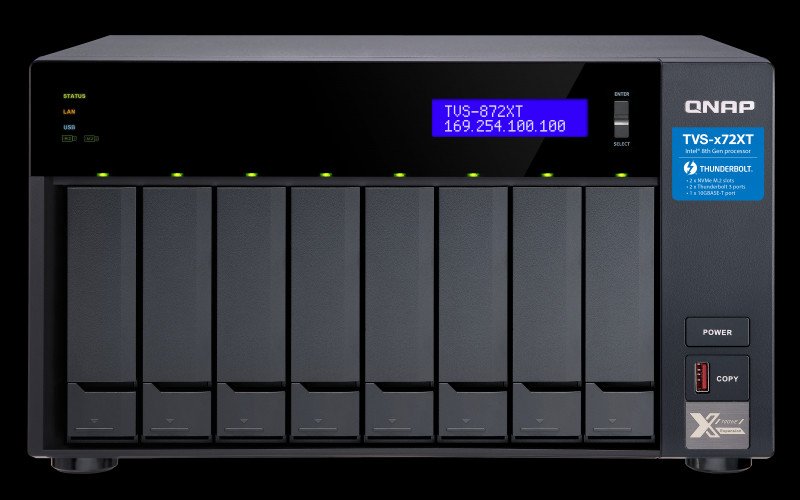
QNAP TVS-872XT-i5
Specifications
Reasons to buy
Reasons to avoid
Bottom line: Sometimes, you simply need additional performance, and that's where the QNAP TVS-872XT-i5 comes into play.
If you're ready to jump into the deep end with network-attached storage, it's time to go with a QNAP NAS equipped with a powerful Intel Core i5-8400T processor. This unlocks additional performance headroom, allowing yet more family members to get online and enjoy stored content on the NAS, not to mention better transcoding support.
This processor is also brilliant at more demanding tasks like transcoding 4K movies through Plex Media Server. This NAS doesn't only have a more powerful CPU than most other servers available but also two Gigabit ports and one 10Gb port for rock-solid connectivity, 16GB of DDR4 RAM (upgradable to 32GB), eight drive bays, and even some expansion slots.
The QNAP TVS-872XT-i5 would also work as a video file storage box for video editing workstations. It's a powerful enclosure with a solid collection of I/O, allowing you to hook up plenty of hardware and accessories. If you can somehow afford this NAS, it's well worth it for busy and tech-savvy households.
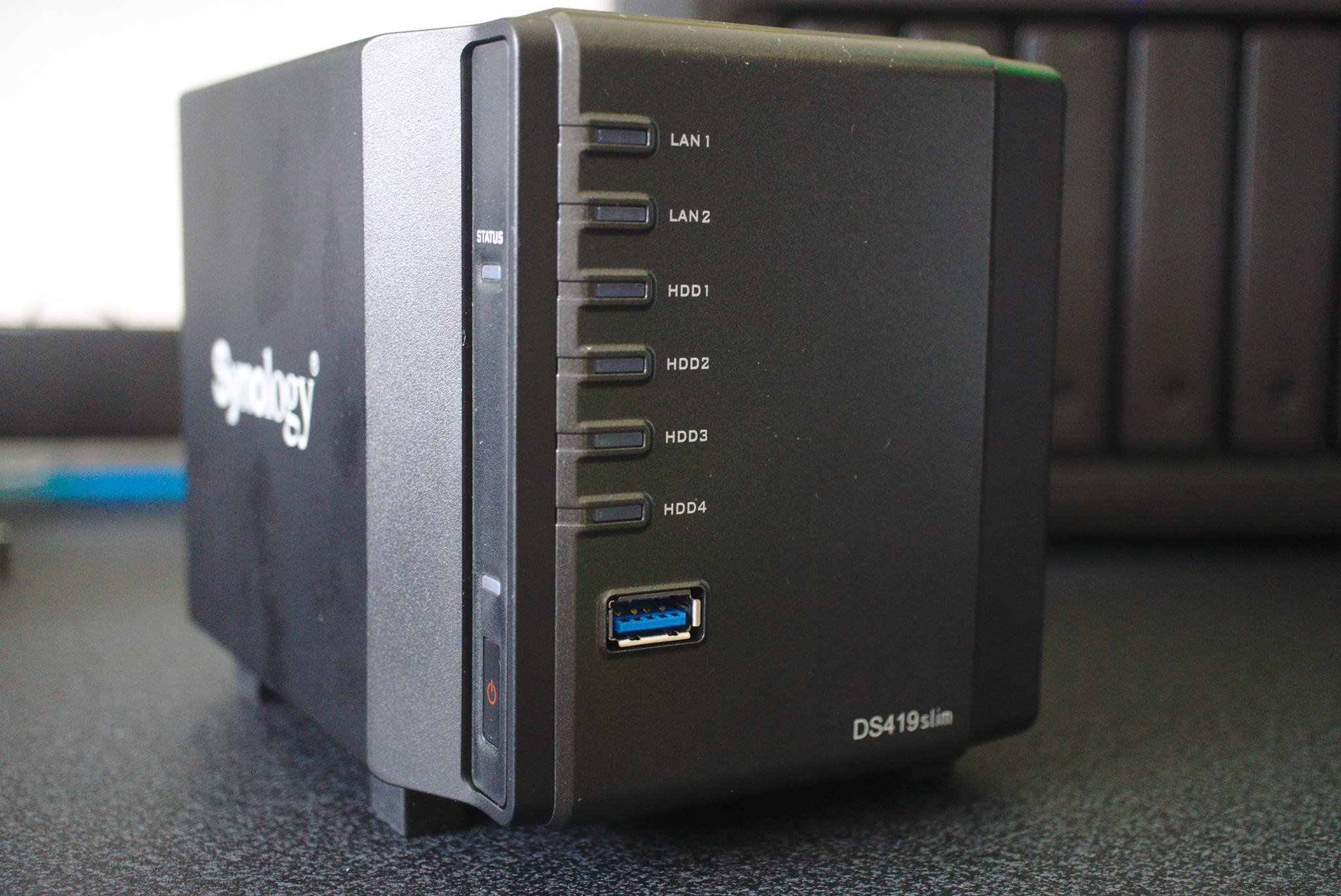
Synology DiskStation DS419slim
Specifications
Reasons to buy
Reasons to avoid
Bottom line: Need storage on the go? Did you know a NAS enclosure could also be portable? You do now with the Synology DiskStation DS419slim. This compact NAS takes only SSDs but the flip side of this is no moving parts and rapid transfer speeds. Just don't expect to store everything you own here.
Synology's DS419slim is an interesting little enclosure. It's super-compact, coming in at just 120mm x 105mm x 142mm, and weighs just 0.66kg. Because it's so small and takes only 2.5-inch drives, Synology needed only to add a single 60mm fan to keep it running cool. Powering everything is a Marvell Armada 385 88F6820 CPU and 512MB DDR3L of RAM.
The four drive bays are ideally suited to SSDs, which further helps this enclosure to be used as portable storage. It's handy having an external drive ready for your trip, but these are limited in capacity and expensive. It'll be easier to carry around just one device that can contain everything you need.
The power draw is low, but you still get some beefy storage and the same OS that runs on Synology's larger NAS enclosures. There are a few drawbacks to this little unit, including the price and the relatively weak CPU. The former is simply a reflection of how much tech has been crammed into such a small package, but the weak CPU will be hard to live with if you expect decent performance for media streaming.
What about all other NAS enclosures?
There are so many NAS enclosures available; it's difficult to throw them all into a single collection. If for some reason, you're not a fan of the DiskStation DS220+ from Synology but desire a similar enclosure, you could pick a similar model from ASUSTOR, TerraMaster, or another brand.
Regardless of what you plan on doing with the NAS enclosure, you can pick a model from any vendor and have a pleasant experience. Some operating systems are more refined (Synology) than others (TerraMaster), but largely they all function similarly, which makes switching between vendors a breeze.
What makes a good NAS enclosure?
A good home NAS has a few drive bays (I'm talking between two and four) with enough RAM to handle more than a single connection. 512MB of RAM can be enough, but if you intend to get everyone online in the home, you may want 1GB or more for better performance. For the CPU, it's all dependent on what you plan to use the NAS for.
There are so many NAS enclosures from which to choose, which span different price points and specifications. You can find one that costs very little but gets you connected with smart storage, and another that costs far more and comes with more powerful hardware. Luckily, there's not a whole lot to a NAS enclosure, aside from these few specifications.
LAN port speed is of no concern since there's a strong possibility your network is still restricted to just 1Gb and is usually determined by your router/switch. USB ports are handy if you plan on connecting accessories, external storage, or other devices, and eSATA is somewhat of a niche for external hard drives.
How much performance do you need?
Deciding on the processor of your NAS is a tricky one to make. ARM processors are pretty good and are used in a wide variety of hardware, including the smartphones we love to glue our eyes to each day. The thing is, they don't make for particularly good NAS servers if you aim to install Plex Media Server, run surveillance systems, and want to do more than a single task on the same NAS.
Intel processors are outstanding, much like their laptop and desktop-class counterparts. Even Celeron and Atom processors are pretty good. Most modern Celeron CPUs in the latest models from vendors will even handle 4K transcoding of movies on Plex. If you genuinely want to go all out with your NAS experience, try to pick one with an Intel Core series CPU.
Really, it all comes down to what you plan on doing with the NAS. If you will only store files and use them as a source for storing backups, an ARM processor is more than good enough. For anything else, it's best to go with an Intel CPU.
What makes for a good Plex NAS?
I've added an option in this collection for best NAS for Plex, but what if you didn't have enough funds to cover the cost? Luckily for you, I also rounded up some fine NAS choices for running Plex Media Server. You don't need an enclosure with an Intel Core processor, so be sure to give that shortlist a look if you want something a little more affordable.
Get the Windows Central Newsletter
All the latest news, reviews, and guides for Windows and Xbox diehards.

Rich Edmonds was formerly a Senior Editor of PC hardware at Windows Central, covering everything related to PC components and NAS. He's been involved in technology for more than a decade and knows a thing or two about the magic inside a PC chassis. You can follow him on Twitter at @RichEdmonds.
